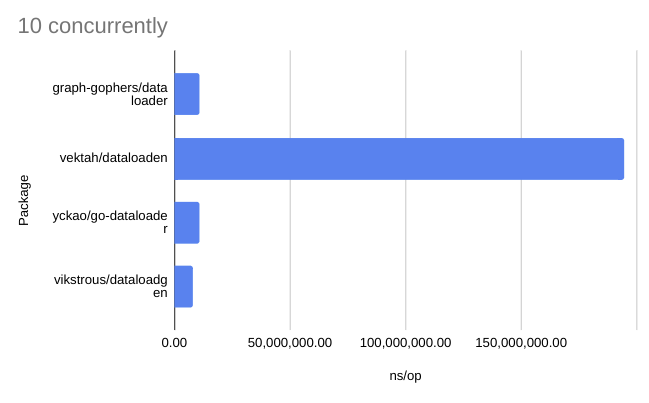dataloadgen is an implementation of a pattern popularized by Facebook's DataLoader.
It works as follows:
- A Loader object is created per graphql request.
- Each of many concurrently executing graphql resolver functions call
Load()on the Loader object with different keys. Let's sayK1,K2,K3 - Each call to
Load()with a new key is delayed slightly (a few milliseconds) so that the Loader can load them together. - The customizable
fetchfunction of the loader takes a list of keys and loads data for all of them in a single batched request to the data storage layer. It might send[K1,K2,K3]and get back[V1,V2,V3]. Alternatively, a mappedFetch function of the loader takes a list of keys and returns a map instead of a list. It might send[K1, K2, K3]and get back{K1: V1, K2: V2, K3: V3}. - The Loader takes case of sending the right result to the right caller and the result is cached for the duration of the graphql request.
Note
The fetch method expect the returned list to correspond to the provided keys in the same order. Alternatively the mappedFetch can be used which allows returning a map, ensuring correct ordering and easy handling of nil values.
Usage:
go get github.com/vikstrous/dataloadgenSee the usage example in the documentation:
package main
import (
"context"
"fmt"
"strconv"
"github.com/vikstrous/dataloadgen"
)
// fetchFn/mappedFetchFn is shown as a function here, but it might work better as a method
// ctx is the context from the first call to Load for the current batch
func fetchFn(ctx context.Context, keys []string) (ret []int, errs []error) {
for _, key := range keys {
num, err := strconv.ParseInt(key, 10, 32)
ret = append(ret, int(num))
errs = append(errs, err)
}
return ret, errs
}
func mappedFetchFn(ctx context.Context, keys []string) (ret map[string]int, errs map[string]error) {
ret = make(map[string]int, len(keys))
errs = make(map[string]error, len(keys))
for _, key := range keys {
num, err := strconv.ParseInt(key, 10, 32)
ret[key] = int(num)
errs[key] = err
}
return ret, errs
}
func main() {
ctx := context.Background()
// Per-request setup code. Either:
loader := dataloadgen.NewLoader(fetchFn)
// or
loader := dataloadgen.NewMappedLoader(mappedFetchFn)
// In every graphql resolver:
result, err := loader.Load(ctx, "1")
if err != nil {
panic(err)
}
fmt.Println(result)
}- dataloaden uses code generation and has similar performance
- dataloader does not use code generation but has much worse performance and is more difficult to use
- yckao/go-dataloader does not use code generation but has much worse performance and is very similar to dataloader.
The benchmarks in this repo show that this package is faster than all of the above and I also find it easier to use.
Benchmark data as CSV
Benchmark,Package,iterations,ns/op,B/op,allocs/op
init-8,graph-gophers/dataloader,"9,242,047.00",130.50,208.00,3.00
init-8,vektah/dataloaden,"1,000,000,000.00",0.27,0.00,0.00
init-8,yckao/go-dataloader,"3,153,999.00",402.10,400.00,10.00
init-8,vikstrous/dataloadgen,"10,347,595.00",114.90,128.00,3.00
cached-8,graph-gophers/dataloader,"4,669.00","222,072.00","25,307.00",522.00
cached-8,vektah/dataloaden,"1,243.00","1,037,044.00","5,234.00",110.00
cached-8,yckao/go-dataloader,"2,312.00","580,860.00","2,273.00",130.00
cached-8,vikstrous/dataloadgen,"1,552.00","824,939.00",776.00,15.00
unique_keys-8,graph-gophers/dataloader,"12,334.00","97,118.00","56,314.00",945.00
unique_keys-8,vektah/dataloaden,"36,489.00","32,507.00","37,514.00",227.00
unique_keys-8,yckao/go-dataloader,"8,055.00","133,224.00","50,180.00",747.00
unique_keys-8,vikstrous/dataloadgen,"42,943.00","27,257.00","22,255.00",230.00
10_concurrently-8,graph-gophers/dataloader,326.00,"11,119,367.00","5,574,460.00","164,247.00"
10_concurrently-8,vektah/dataloaden,100.00,"194,627,574.00","898,977.00","19,502.00"
10_concurrently-8,yckao/go-dataloader,278.00,"10,972,399.00","314,963.00","29,558.00"
10_concurrently-8,vikstrous/dataloadgen,643.00,"8,249,158.00","43,474.00",806.00
all_in_one_request-8,graph-gophers/dataloader,28.00,"39,954,324.00","27,475,136.00","158,321.00"
all_in_one_request-8,vektah/dataloaden,328.00,"3,713,407.00","3,533,086.00","41,368.00"
all_in_one_request-8,yckao/go-dataloader,132.00,"9,060,571.00","4,886,722.00","102,564.00"
all_in_one_request-8,vikstrous/dataloadgen,375.00,"3,206,175.00","2,518,498.00","41,582.00"
To run the benchmarks, run go test -bench=. . -run BenchmarkAll -benchmem from the benchmark directory.




